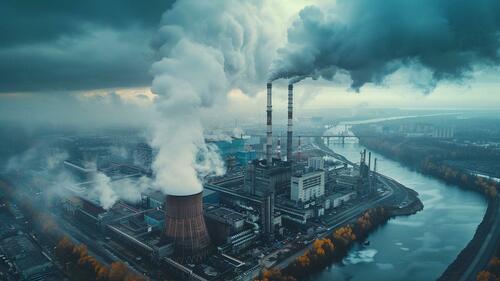A nuclear tragedy could be “dangerously close,” according to the UN’s top nuclear watchdog.
“Let me put it plainly–two years of war are weighing heavily on nuclear safety at Zaporizhzhia Nuclear Power Plant,” said Rafael Mariana Grossi, Director General of the International Atomic Energy Agency (IAEA).
“…Reckless attacks must cease immediately.”
Zaporizhzhia is a small town at the edge of Russian-occupied territory in Ukraine, home to Europe’s largest nuclear plant of the same name. The plant once employed 11,000 workers and provided power to seven countries, but since coming under Russian control, five of its six reactors have remained in cold shutdown. Only one remains partly operational, supplying power to the plant and nearby town.
Many locals and Ukrainian plant workers allege abuse, unsafe working conditions, and even torture by Russian authorities, all of which has caused mounting stress and suffering while leaving the plant vulnerable to human error.
“Now they take people directly from the nuclear plant, say that someone betrayed them, and throw them into basements,” said Dmytro Orlov, mayor of nearby Enerhodar, who finally fled the city. He claimed Russian overseers forced locals to work without pay, food, or sleep.
“It’s simply unimaginable,” Orlov added.
Throughout the war, both sides have used the plant as leverage, citing the risks local attacks pose to the security of nuclear materials inside the plant. The plant drew widespread international attention after a series of kamikaze drone strikes in April, which evoked fears of a Chernobyl-esque disaster that could spread far beyond Ukrainian borders.
“We cannot sit by and watch as the final weight tips the finely balanced scale,” the IAEA’s Grossi warned.
Concerns of a nuclear disaster are back in the spotlight this week, as Russia and Ukraine spat over which side caused a fire that sent black smoke and flames curling from a cooling tower.
“We are waiting for the reaction of the world, we are waiting for the reaction of the IAEA,” Ukraine President Volodymyr Zelensky announced in a video post.
“Russia must be held responsible for this.”
Russian representatives denied involvement in the fire and turned the accusations back on Ukraine, claiming the conflagration was caused by Ukrainian attacks on a nearby city and that it was an act of “nuclear terror.”
Damage to the tower from this latest attack reportedly poses no radiation hazard to the plant or to the surrounding region, though IAEA officials have requested entry to the premises to inspect the wreckage and ensure safety from any possible fallout.
Meanwhile, Ukraine is back on the offensive, carrying the war that has been fought almost entirely on Ukrainian soil straight to their enemy’s front door. Russian President Vladimir Putin has vowed to “kick the enemy out” of its new position in Russian territory, sparking fears of a dramatic retaliation.
“What kind of negotiations can we even talk about with people who indiscriminately strike at civilians, at civilian infrastructure, or try to create threats to nuclear power facilities?” Putin complained following the Ukrainian incursion.
“What can we even talk about with them?”
The situation between the two countries and their allies remains highly volatile, posing safety and economic hazards that could echo across the globe.
This won’t be the first time Russia has used energy shutoffs to force capitulation–just ask the Europeans who suffered and died during the 2023 heat wave, which was exacerbated by Russian-backed energy shortages–but it’s one of the first times in recent memory that nuclear material has been directly in the strategic crosshairs.
-
Best-case scenario: Prices will continue to rise in the wake of a cold war waged via sanctions, embargoes, and harmful economic policies.
-
Worst-case scenario: More countries are forced to enter the war.
Either option could be bad news for non-physical investments, which can be quickly swallowed up by fluctuations in an agitated market.
In a wry quip from Slovenia’s UN Security Council delegate: “Playing with fire is unadvisable–playing with nuclear fuel rods, even less so.”
